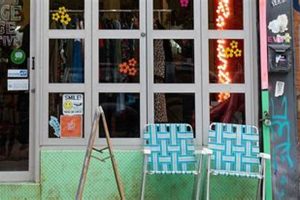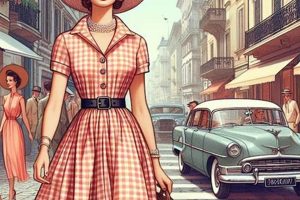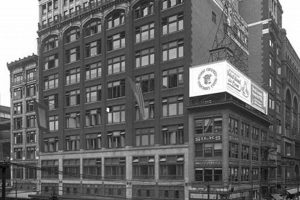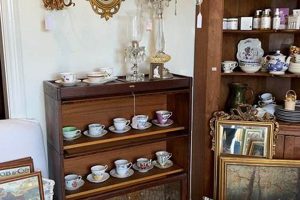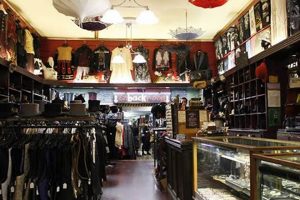Establishments specializing in pre-owned apparel, accessories, and footwear from previous eras, situated within the geographical boundaries of Tucson, Arizona, constitute a niche retail sector. These businesses offer merchandise typically spanning several decades, reflecting diverse styles and design trends of the past. The inventory is often sourced from estate sales, private collections, and donations.
The significance of these establishments resides in several factors. They provide a sustainable alternative to fast fashion, promoting reuse and reducing textile waste. Furthermore, they offer consumers access to unique and often high-quality garments unavailable in contemporary retail environments. Historically, such businesses have served as repositories of fashion history, preserving and showcasing sartorial evolution.
This analysis will delve into the characteristics of the businesses operating in this specific market, examine the types of merchandise commonly found, and consider the consumer base that patronizes them.
Acquiring apparel from establishments specializing in vintage attire requires a discerning approach. The following guidelines are provided to assist in informed purchasing decisions.
Tip 1: Thoroughly Inspect Garments: Examine items under adequate lighting for signs of wear, including stains, tears, and discoloration. Pay particular attention to seams, closures, and linings.
Tip 2: Verify Fabric Composition: Identify the materials used in construction. Natural fibers such as cotton, linen, and wool often indicate higher quality and durability. Assess the fabric’s integrity and suitability for intended use.
Tip 3: Assess Fit Accurately: Sizing standards have evolved over time. Relying solely on labeled size can be misleading. Try on garments whenever possible or, if online, request precise measurements including shoulder width, chest circumference, and garment length.
Tip 4: Inquire About Garment History: Knowledge of an item’s provenance can inform its value and care requirements. Ask the vendor about the garment’s origin, age, and previous owners, if available.
Tip 5: Evaluate Alteration Potential: Consider whether alterations are feasible and cost-effective to achieve a desired fit or style modification. Factor in the complexity of the alteration and the availability of skilled tailors.
Tip 6: Negotiate Price Appropriately: Research comparable items and assess the garment’s condition to determine a fair price. Be prepared to negotiate, particularly for items with flaws or imperfections.
Tip 7: Understand Return Policies: Clarify the establishment’s return policy prior to purchase. Some businesses may offer returns or exchanges, while others operate on a final sale basis.
Adherence to these suggestions promotes responsible and satisfying acquisitions from pre-owned apparel vendors. The result is informed purchases that promote sustainability and individual style.
The subsequent section will address the unique characteristics of individual businesses within this retail sector.
1. Era Representation
Era Representation, concerning establishments trading in pre-owned garments within Tucson, signifies the temporal scope of the merchandise offered. A business may specialize in a specific period, such as the mid-century modern styles of the 1950s and 1960s, or offer a broader selection encompassing multiple decades. The deliberate curation of items from distinct eras directly impacts the store’s identity, consumer base, and the perceived value of its inventory. A store specializing in a single era may cultivate a reputation as a dedicated resource for enthusiasts of that particular style, attracting a more specialized and informed clientele. Conversely, a broader selection may appeal to a wider range of customers but necessitate a deeper understanding of the fashion history and market value associated with each era represented.
The correlation between Era Representation and inventory sourcing is significant. Establishments specializing in earlier decades often rely on estate sales, antique auctions, and private collections to acquire merchandise. This sourcing model necessitates expertise in identifying authentic pieces and assessing their condition. Stores featuring more recent decades may utilize consignment agreements or accept donations, resulting in a more diverse and potentially less curated selection. A direct consequence of a well-defined Era Representation is its impact on pricing. Garments from highly sought-after eras or designers can command premium prices, reflecting their rarity and historical significance. Conversely, items from less popular periods may be priced more competitively to attract a broader consumer base.
In summation, the concept of Era Representation is integral to the character and functionality of businesses specializing in pre-owned apparel within Tucson. It dictates the sourcing strategies employed, influences pricing models, and defines the store’s identity within the local retail landscape. A clear understanding of Era Representation is therefore essential for both proprietors of these establishments and consumers seeking authentic garments from specific historical periods, the result is that the store can cultivate its brand and serve clients better.
2. Inventory Sourcing
Inventory Sourcing is a critical element in the operational model of establishments specializing in pre-owned apparel in Tucson. The strategies employed to acquire merchandise directly influence the quality, authenticity, and pricing of the garments offered, ultimately shaping the consumer experience.
- Estate Sales and Auctions
Estate sales and auctions represent a primary channel for acquiring older, high-value items. These sources often yield garments from prior decades, potentially including designer pieces or unworn merchandise. The sourcing process requires expertise in identifying valuable items and navigating the competitive auction environment. Success in this area can result in the acquisition of unique, high-quality garments that enhance a store’s reputation, but the process may involve significant time investment and financial risk.
- Consignment Agreements
Consignment agreements involve partnerships with individuals who offer their pre-owned clothing for sale through the store. The establishment typically receives a percentage of the sale price. This sourcing strategy offers a diverse range of styles and sizes, potentially attracting a broader customer base. However, managing consignment inventory requires diligent tracking and clear agreements regarding pricing and return policies. The quality and condition of consigned items can vary considerably, necessitating careful screening.
- Donations
Accepting donations is a sourcing method that provides access to a wide range of garments at minimal initial cost. Donations may include items from various decades and price points, offering opportunities to cater to diverse customer preferences. Sorting and processing donated items requires significant labor and resources to identify valuable pieces and discard unsuitable garments. While donations can be a cost-effective sourcing option, the resulting inventory may lack the curated selection found in stores relying on estate sales or consignment.
- Wholesale Vintage Suppliers
Wholesale vintage suppliers specialize in sourcing and distributing pre-owned clothing in bulk. This option offers convenience and consistency in inventory acquisition, particularly for stores seeking to maintain a certain level of stock. While wholesale suppliers may provide garments at competitive prices, the selection may be less unique compared to items sourced from estate sales or private collections. Building relationships with reliable wholesale suppliers is essential for ensuring consistent inventory quality and timely delivery.
The effectiveness of each sourcing strategy depends on factors such as the store’s target customer, budget constraints, and expertise in vintage clothing. Tucson establishments often employ a combination of these methods to create a balanced and appealing inventory. Ultimately, strategic inventory sourcing is fundamental to establishing a sustainable and profitable pre-owned apparel business.
3. Pricing Structure
The establishment of a pricing structure is fundamental to the viability and success of any retail enterprise, particularly within the specialized market of pre-owned garment vendors in Tucson. Pricing strategies employed directly influence profitability, inventory turnover, and customer perception of value. Several factors necessitate careful consideration when determining the monetary value assigned to individual items.
- Condition Assessment and Valuation
The physical state of a garment exerts significant influence on its pricing. Items exhibiting minimal wear, absent of damage such as stains, tears, or alterations, typically command higher prices. Grading systems, often based on subjective evaluation, are frequently utilized to categorize condition (e.g., mint, excellent, good, fair). The presence of original tags or packaging further enhances perceived value. However, determining the extent to which minor imperfections impact price requires experience and an understanding of prevailing market trends.
- Rarity and Desirability
The scarcity and current demand for a specific garment significantly affect its price point. Items from limited-edition collections, designer collaborations, or highly sought-after eras generally command premium prices. Market research, including examination of online auction sites and competitor pricing, is essential for gauging desirability. However, predicting future trends and adjusting pricing accordingly requires foresight and an awareness of evolving consumer preferences within the pre-owned garment market.
- Brand Recognition and Heritage
Garments produced by established or prestigious brands often maintain higher resale values, reflecting consumer confidence in quality and design. The historical significance of a particular brand or its association with specific cultural movements can further elevate pricing. Authentication of designer items is paramount to ensure accurate valuation and prevent misrepresentation. Maintaining awareness of brand reputation and historical context is crucial for informed pricing decisions.
- Cost of Acquisition and Overhead
While the aforementioned factors relate to the intrinsic value of the garment, the pricing structure must also account for the costs incurred in acquiring and maintaining inventory. These costs may include expenses related to sourcing (e.g., estate sale participation, consignment fees), cleaning and restoration, storage, and retail operations. A viable pricing structure necessitates a sufficient margin to cover these expenses and generate a profit. A thorough understanding of cost accounting principles is essential for establishing sustainable pricing strategies.
In conclusion, a carefully considered pricing structure is essential for businesses specializing in pre-owned garments in Tucson. Balancing the inherent value of the item with market demand and operational costs ensures profitability and fosters customer trust. Continuous monitoring of market trends and adaptation of pricing strategies are necessary for maintaining a competitive edge within this dynamic retail sector. The result of following these key concepts and ideas is a well-oiled machine for “vintage clothing stores tucson”.
4. Community Impact
The presence of establishments specializing in pre-owned apparel within Tucson generates multifaceted effects on the local community. These effects extend beyond purely economic transactions, encompassing environmental sustainability, cultural preservation, and the fostering of a unique local identity.
- Promotion of Sustainable Consumption
These businesses actively contribute to reducing textile waste by extending the lifespan of clothing items. This practice mitigates the environmental impact associated with the production of new garments, including resource depletion and pollution. By offering a viable alternative to fast fashion, these stores encourage more sustainable consumption patterns within the community. Examples include reduced landfill waste and decreased demand for resource-intensive manufacturing processes. The implications extend to fostering a greater awareness of environmental responsibility among consumers.
- Preservation of Local History and Style
Pre-owned clothing often reflects the sartorial trends and cultural influences of past eras within Tucson. Establishments that curate and showcase these garments contribute to preserving the region’s unique history and style. This can involve collecting and displaying garments with local significance or organizing events that celebrate Tucson’s fashion heritage. The implications include strengthening local identity and providing educational opportunities for residents and visitors alike.
- Support for Local Economy and Entrepreneurship
These stores typically operate as small, independent businesses, contributing to the diversification of the local economy. They provide employment opportunities and generate revenue that remains within the community. Furthermore, they may collaborate with local artists, designers, and craftspeople, fostering a creative ecosystem. The implications are positive for local economic growth and the promotion of entrepreneurial ventures.
- Creation of Unique Retail Environments
Establishments specializing in pre-owned apparel often cultivate distinctive atmospheres that distinguish them from mainstream retailers. This can involve the use of vintage furniture, curated displays, and personalized customer service. These unique retail environments enhance the shopping experience and contribute to the overall appeal of Tucson as a destination for distinctive and independent businesses. The implications are positive for attracting tourists and fostering a vibrant local culture.
The cumulative impact of these facets underscores the significance of pre-owned apparel businesses in shaping the social, environmental, and economic landscape of Tucson. These establishments contribute to a more sustainable, culturally rich, and economically diverse community, thereby enhancing the overall quality of life for its residents. Additional examples include the increased interest from tourism, which helps inject money into the economy, and helps establish Tucson as a destination location for vintage shopping.
5. Specialized Selection
The term “Specialized Selection,” when applied to establishments offering pre-owned apparel in Tucson, denotes a deliberate curation of inventory focused on specific criteria. This specialization deviates from a generalized approach, concentrating instead on identifiable niches within the broader category of vintage clothing. The causal effect is a refined customer experience and, potentially, heightened expertise in a given style or period. For example, a store may specialize in vintage western wear, catering to enthusiasts of that specific aesthetic. This focus dictates sourcing strategies, marketing efforts, and the overall store ambiance. The importance of this approach lies in its ability to attract a targeted clientele, fostering customer loyalty and enhancing the store’s reputation as a source for unique and authentic merchandise.
Further examples include businesses that specialize in vintage formal wear, designer pieces from a particular era, or apparel catering to specific subcultures, such as rockabilly or goth. The practical application of this understanding is multifaceted. For store owners, specialization allows for a more efficient allocation of resources, targeted marketing campaigns, and the development of in-depth product knowledge. For consumers, it simplifies the shopping experience by providing a concentrated source for items that align with their specific interests. The result is a more satisfying and efficient acquisition process. These specific strategies help bring value to “vintage clothing stores tucson”.
In summary, “Specialized Selection” functions as a critical differentiator within the vintage apparel market in Tucson. It enables stores to cultivate distinct identities, cater to niche audiences, and establish themselves as authoritative sources for specific styles. This approach presents challenges related to maintaining consistent inventory and adapting to evolving consumer preferences. However, the benefits of a well-defined specialization outweigh these challenges, contributing to the long-term sustainability and success of these businesses and provides a distinct shopping experience to locals.
Frequently Asked Questions Regarding Establishments Offering Pre-Owned Garments in Tucson
The following represents a compilation of inquiries commonly posed concerning businesses specializing in the sale of vintage apparel within the Tucson metropolitan area. Answers are provided to clarify misconceptions and offer guidance for consumers.
Question 1: What constitutes “vintage” apparel in the context of these establishments?
The term “vintage” is generally applied to clothing items that are at least 20 years old. However, individual businesses may establish their own criteria based on style, brand, and perceived collectibility.
Question 2: How does the pricing of pre-owned garments compare to that of new clothing items?
Pricing varies considerably depending on factors such as condition, rarity, brand, and historical significance. Some vintage items may be priced higher than contemporary apparel due to their unique qualities or scarcity.
Question 3: Are there measures in place to ensure the cleanliness and hygiene of pre-owned garments?
Reputable establishments typically clean and sanitize garments prior to offering them for sale. It is advisable to inquire about the specific cleaning methods employed.
Question 4: What recourse is available if a purchased garment is found to be damaged or misrepresented?
Return policies vary. Consumers are advised to carefully review the establishment’s return policy prior to making a purchase. Documenting the condition of the item at the time of purchase is recommended.
Question 5: How can the authenticity of designer or branded vintage items be verified?
Authentication requires expertise in identifying specific design features, labels, and manufacturing techniques. Reputable establishments may offer authentication services or provide documentation to verify the item’s origin. Independent authentication services are also available.
Question 6: Are alterations typically offered or available for pre-owned garments?
Some establishments may offer in-house alteration services or provide referrals to local tailors. Inquiring about alteration options prior to purchase is recommended.
The information provided herein serves as a general guide. Direct communication with individual establishments is recommended to address specific concerns or questions.
The subsequent section will address the future trends and potential developments within the market for pre-owned garments in Tucson.
Conclusion
This analysis has explored the multifaceted characteristics of establishments specializing in pre-owned apparel within Tucson. It has examined inventory sourcing methods, pricing structures, community impact, and specialized selection strategies. Understanding these elements provides a comprehensive perspective on this unique retail sector.
The continued success of “vintage clothing stores tucson” hinges upon adaptability to evolving consumer preferences, sustainable business practices, and a commitment to preserving the cultural significance of garments from past eras. Further research could explore the impact of online marketplaces and the evolving definition of “vintage” in contemporary society. These establishments have a distinct opportunity to shape the future of sustainable fashion within the local community.



